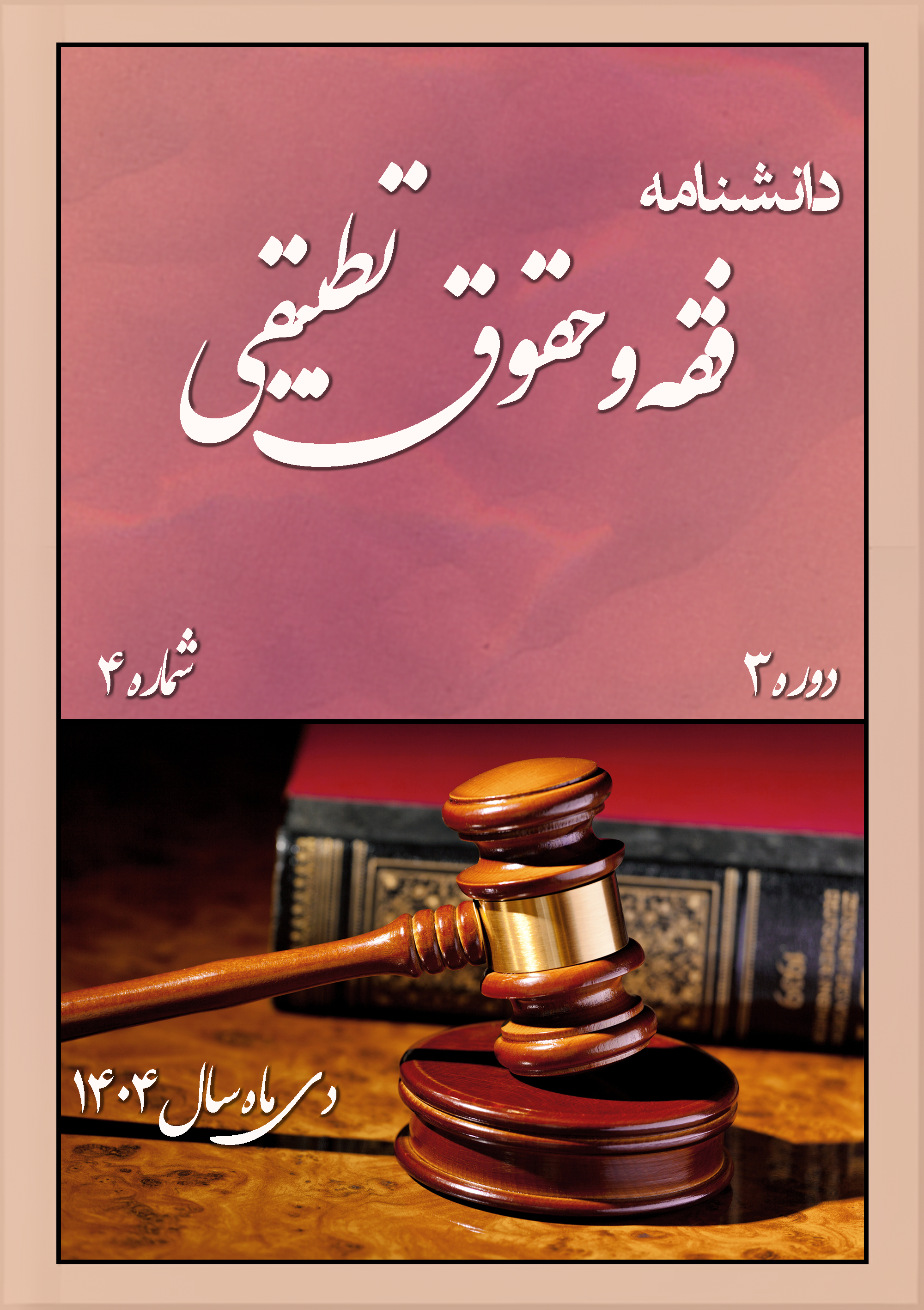Parental Civil Liability for Fetal Disorders in the Legal Systems of Iran and the United States
Keywords:
parental liability, fetal disorders, negligence, protection of fetal rights, Iranian law, U.S. lawAbstract
This article examines the issue of parental liability for fetal disorders through a comparative approach between the legal systems of Iran and the United States. The fetal period, regarded as the most sensitive and critical stage in the formation of the human body and psyche, holds particular significance in this discussion. Parental roles in this context are manifested through actions such as genetic counseling, disclosure of genetic histories, and prenatal care. Today, not only medical norms but also public customs emphasize the necessity of such measures, and parents who fail to fulfill these duties are held accountable. This study, conducted using a descriptive-analytical method, concludes that parental negligence—when it endangers fetal health and results in disorders, illnesses, or disabilities—renders parents liable for compensating the damages inflicted upon the fetus. It is also recommended that, given the importance of the fetal period and the fetus's inability to make decisions concerning its own health, the legislator should enact specific protective laws to safeguard fetal rights. Ultimately, inspired by the U.S. legal system, the article proposes that Iranian law should also require parents who opt for in vitro fertilization (IVF) and are aware of the risk of transmitting lethal or serious genetic abnormalities to their offspring, to employ preventive measures such as preimplantation genetic diagnosis (PGD).
Downloads
References
al-Hurr al-Amili, M. i. a.-H. (1989). Tafsil Wasa’il al-Shi’a ila Tahsil Masa’il al-Shari'ah. Al al-Bayt Institute.
al-Kulayni, A. J. f. M. i. Y. q. (1987). Al-Kafi. Dar al-Kutub al-Islamiyyah.
al-Muhaqqiq al-Thani al-Amili, A. i. a.-H. a.-K. (1995). Jami’ al-Maqasid fi Sharh al-Qawa’id (Vol. 9). Al al-Bayt Institute.
al-Shahid al-Thani, Z. a.-D. i. A. a.-A. (1990). Al-Rawdah al-Bahiyyah fi Sharh al-Lam’ah al-Dimashqiyyah. Davari Bookstore.
al-Shahid al-Thani, Z. a.-D. i. A. a.-A. (1993). Masalik al-Afham ila Tanqih Sharayi’ al-Islam (Vol. 1). Institute of Islamic Knowledge.
al-Tabarsi, H. i. F. (1976). Makarem al-Akhlaq. Farahani Publications.
al-Turayhi, F. a.-D. (1996). Majma’ al-Bahrayn (Vol. 5). Mortazavi Bookstore.
al-Tusi, A. J. f. M. i. a.-H. (2008). Al-Mabsut fi Fiqh al-Imamiyyah (Vol. 4). Al-Maktabah al-Murtazawiyyah.
Amini, A. (2003). Medicine Before Birth. Tayyeb Publications.
Azimzadeh Ardabili, F., Mohaqqeq Damad, M. a.-S., & Hasheminejad, N. (2024). The Jurisprudential, Legal, and Ethical Common Criterion Between Destruction of Frozen Embryo and Abortion. Fiqh and Family Law, 29(80), 105-135.
Bahiraei, A. (2007). Prenatal Care (et al. ed.). Mersa Publications.
Berk, L. E. (2007). Developmental Psychology: From Conception Through Childhood. Arasbaran Publishing.
Buchanan, A., Brock, D. W., Daniels, N., & Winkle, D. (2012). From Chance to Choice: Genetics and Justice. Cambridge University Press.
Collins, E. F. (1983). An Overview and Analysis: Prenatal Torts, Preconception Torts, Wrongful Life, Wrongful Birth and Wrongful Death: Time for a New Framework. Journal of Family Law, 22, 677-711.
Davis, D. (1997). Genetic dilemmas and the child's right to an open future. Hastings Center Report, 27(2), 7-15. https://doi.org/10.2307/3527620
Davis, D. (2001). Genetic dilemmas: Reproductive technology, parental choices, and children's futures. Routledge.
Detrick, S. (2023). A Commentary on the United Nations Convention on the Rights of the Child. Brill, Nijhoff.
Emami, H. (1987). Civil Law (Vol. 1). Eslamiyeh Bookstore.
Feinberg, J. (1980). The child's right to an open future. In W. H. Aiken & T. LaFollette (Eds.), Children's Rights, Parental Authority, and State Power (pp. chapter 6). Littlefield.
Goodwin, M. (2010). A view from the cradle: Tort law and the private regulation of assisted reproduction. Emory law Journal, 59, 1039-1100. https://doi.org/10.2139/ssrn.1724920
Griffin, J. (1986). Well-being: Its meaning, measurement, and moral importance. Oxford University Press.
Hekmatnia, M. (2007). Civil Liability in Imamiyyah Jurisprudence. Research Institute of Islamic Sciences and Culture.
Ibn Idris al-Hilli, M. i. M. i. A. (1990). Al-Sarair al-Hawi li-Tahrir al-Fatawa (Vol. 3). Islamic Publications Office.
Ibn Manzur, A. a.-F. J. a.-D. M. i. M. (1994). Lisan al-Arab (Vol. 13). Dar al-Fikr.
James, D., Steer, P., Weiner, C., Gonik, B., & Robson, S. (2017). High-Risk Pregnancy: Management Options. Cambridge University Press. https://doi.org/10.1017/9781108664677
Jawhari, I. i. H. (1990). Al-Sihah: Taj al-Lugha wa Sihah al-Arabiya (Vol. 4). Dar al-Ilm lil-Malayin.
Katouzian, A. N. (2008). Family Law. University of Tehran Press.
Kigotho, W. (2006). Facing Financial Difficulties, African Virtual U. Revamps Itself. Chronicle of Higher Education, 53(7), 1-44.
Lankarani, M. F. M. (1988). Al-Qawa'id al-Fiqhiyyah. Mehr Press.
Mir Mohammadi, S. M. H. (2015). An Introduction to Ronald Dworkin's Theory of Justice. Elmī va Farhangī Publications.
Molaei, M. (2022). A Jurisprudential and Legal Analysis of Fetal Legal Capacity in Iranian and U.S. Legal Systems. Fiqh and Family Law, 27(76), 263-292.
Morshed Selouki, M. (1990). The Physician and Divine Responsibility. Kalameh Publications.
Najafi, S. M. H. (2013). Jawahir al-Kalam fi Sharh Sharayi' al-Islam (Vol. 10). Dar al-Kutub al-Islamiyyah.
Papalia, D., Sally, O., & Feldman, R. (2009). Human Development. McGraw-Hill.
Parfit, D. (1984). Reasons and Persons. Oxford University Press.
Rawls, J. (2024). A Theory of Justice. Markaz Publications.
Safa'i, S. H. (2016). Parental Civil Liability Toward the Fetus. University of Tehran Press.
Sahib ibn 'Abbad. (1993). Al-Muhit fi al-Lughah (Vol. 6). Alam al-Kitab.
Savulescu, J., & Kahane, G. (2009). The moral obligation to create children with the best chance of the best life. Bioethics, 23(5), 274-290. https://doi.org/10.1111/j.1467-8519.2008.00687.x
Trotzig, M. A. (1980). The Defective Child and the Actions for Wrongful Life and Wrongful Birth. Family Law Quarterly, 14(1), 15-40. https://doi.org/10.1080/01947648009513322
Zakariya, A. a.-H. (1995). Mu’jam Maqayis al-Lughah (Vol. 1–2). Islamic Propagation Office Publications.
Downloads
Published
Submitted
Revised
Accepted
Issue
Section
License
Copyright (c) 2025 راضیه عبدالصمدی; امیر حسین حبیباللهیان (نویسنده)

This work is licensed under a Creative Commons Attribution-NonCommercial 4.0 International License.










